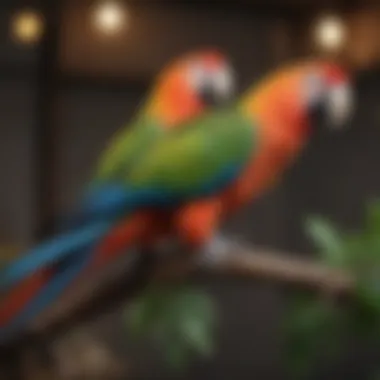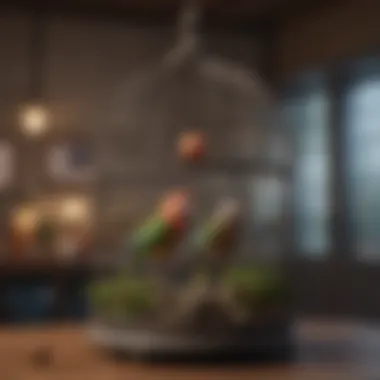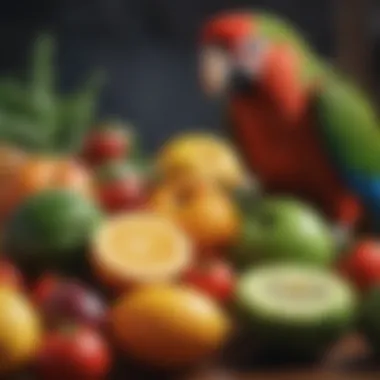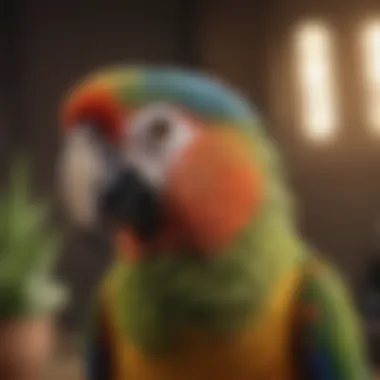The Best Pet Parrot: Choosing Your Perfect Avian Companion


Intro
When considering bringing a pet parrot into your home, it is critical to understand the nuances associated with avian care. Parrots are not just cute companions; they are intelligent beings with complex needs. This article aims to provide a comprehensive guide to choosing the right pet parrot and ensuring a fulfilling, responsible ownership experience. We will explore bird species, dietary requirements, social needs, and the emotional bonds that develop between humans and parrots.
Avian Care Basics
Understanding proper avian care is the foundation of responsible pet parrot ownership. This care encompasses nutrition, habitat, grooming, and regular social interaction. Each bird species may have distinct traits and particular requirements, thus highlighting the need for thorough education before bringing a parrot home.
Importance of Proper Nutrition
A nutritious diet is essential for your parrot's longevity and quality of life. Pellets, fruits, and vegetables create a good dietary foundation. However, reliance solely on one type of food is inadvisable. Parrots benefit from a diverse range of nutrients. Some key recommendations include:
- Fresh vegetables like leafy greens, carrots, and bell peppers.
- Fruits such as apples and berries, but keep portions moderate due to sugar content.
- High-quality pellets formulated specifically for your bird species.
- Limited seeds and nuts which should be treats rather than staples.
Understanding Bird Species and Their Needs
Parrots come in many forms, each exhibiting unique behaviors and needs. Different types of parrots such as Amazon, African Grey, and Budgerigar have specific characteristics that affect their care. For instance, African Greys are known for their intelligence and require mental stimulation. Conversely, Budgerigars need less space and social interaction but thrive in groups. Researching the species you are interested in is crucial for successful ownership.
Basics of Birds Habitat Setup
Creating a suitable habitat for your parrot goes beyond just placing a cage in a corner. Consider these aspects:
- Cage Size and Structure: The cage must be spacious with horizontal bars for climbing.
- Location: Position the cage in a visible area without direct sun or drafts uncovered. Parrots are social birds that enjoy company.
- Environment Enrichment: Include perches, toys, and places to hide.
Grooming and Hygiene Tips
Regular grooming is an essential aspect of parrot care. Birds require feather care, nail trimming, and clean living spaces for optimal health. Bathing is also beneficial. Schedule regular baths, either by misting with water or offering a shallow dish. This practice keeps feathers in good condition and promotes bonding.
Interacting with Your Pet Bird
Building a strong connection with your pet parrot involves patience and understanding. This relationship is beneficial for both parrot and owner.
Building Trust and Connection
Taming and developing trust with your parrot can take time. Spend periods nearby, speaking softly to them. Offering treats gradually encourages feelings of safety and companionship.
Training Techniques and Tips
Behavior training leads to a more harmonious home. Begin with simple commands like “step up” using positive reinforcement techniques. Reward desired behaviors to encourage obedience. It’s important to remain patient; this behavior doesn’t happen overnight.
Fun Activities for Bird Owners and Their Birds
Parrots enjoy playtime. To keep your bird engaged, incorporate activities like:
- Puzzle toys that stimulate their cognitive skills.
- Interactive games such as fetch with small balls. This will not only strengthen your bond but also allow them to experience joy and mental engagement.
Recognizing Bird Cues and Behaviors
Understanding bird communication is essential. Recognizing their body language can help you interpret their feelings. Swaying may indicate excitement, while ruffled feathers can imply stress or discomfort. Responsive owners create environments conducive to their pet's feelings of security.
Emotional Well-Being of Birds
Emotional health is often overlooked yet remarkably important for parrot well-being. Parrots are social beings, prone to loneliness and stress if neglected.
The Role of Play and Socialization
Playtime fosters companionship and mental stimulation. Interactions with humans and other birds promote social skills. Introduce regular, varied activities.
Enhancing Birds' Emotional Health
Providing companionship through toys and safe socialization options plays a valuable role in emotional enhancement. Rotate toys regularly to prevent boredom and stimulate interest.
Assessing Bird Stress and Remedies
Signs like excessive screaming or feather plucking often signal displacement or stress. If noticeable, investigate possible sources of stress within their environment and make appropriate adjustments.
Building Strong Human-Bird Bonds
Strengthening the bond between pet and owner creates a mutually rewarding dynamic. Investing time and resources creates a special relationship, unique and irreplaceable.
Bird Health and Safety
Bird ownership comes with responsibilities, particularly health and safety considerations.


Common Health Issues and Prevention
Regular attention to general bird health is vital. Obesity, respiratory ailments, or feather-related diseases are common issues. Owning a quality diet and ensuring proper mental stimulation will go a long way in preventing these conditions.
Routine Veterinary Care
An avian veterinarian should be part of your health care plan. Routine exams allow for early detection of possible issues. Birds often hide health problems until they become severe.
Environmental Hazards to Avoid
Parrots are sensitive creatures. Environmental hazards include kitchens where hot surfaces can lead to severe injuries, or exposure to aerosol sprays. Being vigilant about your bird’s environment maintains better safety standards.
Signs of Illness or Distress
Birds,既 zin gene of habit, making their behavior following specific routines. Inappetence, altered droppings, or changes in vocalizations might signal underlying health issues. Immediate attention is imperative should any such signs present themselves.
Fun Facts and Quirky Insights
Understanding parrot behaviors remains a rich subject filled with wonders.
Unique Traits of Popular Bird Species
Many bird species display traits that can be fascinating. For instance, Macaws are known for their beauty, and African Greys are commonly regarded for their remarkable vocabulary.
Historical and Cultural Significance of Birds
Throughout history, birds have inspired artists, writers, and thinkers. Their adaptation to human life represents resilience.
Famous Bird Owners and Their Stories
Many notable figures, such as Pliny the Elder, have embraced avian companions, sharing stories of their experiences and the exclusive plants found in their kingdoms. Each story sheds light on the evolving relationship between humans and birds over centuries.
Prelude to Pet Parrots
Choosing a pet is a significant decision that can impact a person's life. The introduction of pet parrots in this context is crucial. Parrots are not just any pets; they require deeper commitment and understanding due to their intelligence and social nature. These avian companions can provide joy, companionship, and even challenges that enrich their owner's life. Understanding what it means to bring a parrot into a home is the first step in making a responsible decision.
The Appeal of Parrots as Pets
Parrots have a unique attraction that draws many people to them. Their vibrant colors captivate the eye, and their ability to mimic human speech enhances their charm. Owning a parrot is like inviting an engaging conversation partner into your home. However, this appeal comes with expectations. Owning a parrot means being ready to engage with a creature that thrives on social interaction and mental stimulation.
- Social Creatures: Parrots are naturally social animals. They form deep bonds with their owners, offering companionship and emotional support.
- Intelligence: Many parrot species, like Amazon and African Grey, are known for their high intelligence. This makes them not only entertaining but also challenging, as they require mental challenges and stimulation.
- Lifespan: Compared to other pets, many parrot breeds can live for decades, some even over 50 years. This makes commitment essential.
Ultimately, the appeal of having a parrot as a pet involves considering not just the joy they can bring, but also the ongoing responsibilities that accompany parrot ownership.
Overview of Popular Parrot Species
To make an informed decision, prospective parrot owners should be familiar with différentes popular species. Each species has distinct characteristics that affect care and compatibility with an owner's lifestyle:
- Cockatiels: Known for their charming and friendly nature, they make great companions and can be relatively easy to care for.
- Budgerigars: Often referred to as budgies, they are small, colorful, and sociable birds that can be kept in indoor spaces quite easily.
- Amazon Parrots: These are known for being lively and vocal. They are larger and require more social interaction than smaller species.
- African Grey Parrots: Highly regarded for their intelligence and ability to mimic human speech, they best suit experienced bird owners.
- Macaws: These colorful giants are impressive, but they need a lot of space and dedicated time from their owners.
Each species has unique traits that make them special, yet not all may fit well into every household. Understanding these differences is essential when choosing the right companion.
Understanding Different Parrot Breeds
Understanding different parrot breeds is crucial for anyone considering bringing one of these magnificent creatures into their home. With a variety of species that differ significantly in behavior, size, sociability, and care needs, selecting the right breed directly impacts the harmony of your household. Breeds have unique characteristics that affect not only their health discussed in this article but also how they interact with humans and other pets. Knowledge of these traits enables you to make informed decisions about habitat requirements, dietary needs, and social interaction, ensuring both you and your potential pet lead fulfilling lives.
Cockatiels: The Charming Companion
Cockatiels are small to medium-sized parrots known for their playful nature and affection towards humans. They possess an endearing ability to mimic sounds, including whistles and short phrases. This makes them engaging companions for family environments.
Cockatiels require relatively smaller spaces compared to larger parrot species, making them ideal for homes with limited room. Their diet should include a mixture of pellets, seeds, and fresh fruits and vegetables to maintain their health. Moreover, they thrive on social interaction and love to engage in playtime.
Pros of Cockatiels:
- Affectionate and social
- Entertaining vocalizations
- Manageable space requirements
Considerations: Regular interaction is essential; loneliness can lead to behavioral issues.
Budgerigars: Small Yet Vibrant
Budgerigars, often affectionately called budgies, are a favorite among novice bird owners. These small parakeets demonstrate high energy levels and vivid colors, which enchant many. Budgies are also quick learners, capable of developing vocabularies if promptly trained.
They require a moderate amount of space, significantly benefiting from a larger cage equipped with toys that stimulate mental activity. Their diet should consist of specific pellets, seed mixtures, and vegetables. It's worth noting that these birds are incredibly social and do well in pairs or small groups; loneliness can negatively affect their well-being.
Pros of Budgerigars:


- Colorful and active
- Easy to care for
Considerations: They appreciate company; isolation should be avoided.
Amazon Parrots: Intelligent and Social
Amazon parrots are well known for their intelligence and outgoing personalities. They often impress owners with their conversational abilities, showing robust and vocal tendencies that can brighten any home. Their fondness for socializing makes them exceptional companions.
These parrots fare well in larger spaces, where they can exercise and demonstrate their playful behaviors. A balanced diet consisting of pellets, seeds, fresh fruits, and vegetables is critical for their health. Their strong personalities require dedicated care and training to avoid challenges that stem from boredom and lack of stimulation.
Pros of Amazon Parrots:
- Highly sociable and intelligent
- Capable of extensive vocal communication
Considerations: They thrive on interaction; absence can cause distress.
African Grey Parrots: The Highly Intelligent Choice
African grey parrots stand out. They are arguably one of the most intelligent parrot species, showcasing remarkable problem-solving abilities. Their talent for mimicry and communication is known to rival that of many primates.
These medium to large parrots need considerable space and mental stimulation to thrive. Enriching environments that include varied toys and challenges can foster their intelligence positively. Importantly, their diet must consist of high-quality pellets, seeds, and natural greens, ensuring proper nutrition.
Pros of African Grey Parrots:
- Exceptional comprehension and communication
- Can form deep bonds with humans
Considerations: They require substantial mental stimulation to avoid behavioral issues due to stress.
Macaws: The Colorful Giants
Macaws are large, vibrant parrots characterized by their striking colors and playful personalities. They require ample space due to their size and strength. These birds need large enclosures and a lot of time outside their cages for mental and physical exercise.
Macaws' diet consists of specialized pellets, nuts, seeds, and an array of fruits and vegetables. Their playful nature makes them joyfully engaging companions. However, owning a macaw involves a commitment of time and energy for social interaction and daily care.
Pros of Macaws:
- Eye-catching colors and personalities
- Energetic and engaging
Considerations: High maintenance; they need constant attention to thrive and avoid developing behavioral problems.
Macaws and African Grey parrots offer substantial companionship but demand dedication to their social, emotional, and physical needs.
Choosing the right parrot is pivotal. Each species encompasses distinct characteristics and requirements. Understanding these intricacies is key to healthier relationships and nurturing environments.
Factors to Consider When Choosing a Parrot
Choosing a parrot is a significant decision that goes beyond mere aesthetics. There are many factors that deserve careful thought. Parrots are not only about vibrant colors and enchanting personalities; they are complex creatures with various needs and characteristics. Understanding the numerous factors involved enhances your responsibilities as a bird owner and provides insights into the thriving bond you can build.
Time Commitment and Lifespan
Parrots can live for several decades, with some species easily surpassing 30 years. This means that, when you choose a parrot, you are committing to a long-term relationship. Potential owners must evaluate the time they can dedicate to their new feathered friend.
Most parrot species require daily interaction. This includes speaking, playing, and training. Spend several hours with your bird each day to meet their social needs. Skipping this interaction can lead to behavioral issues like boredom or loudness.
Moreover, regular care is essential. Cleaning cages, preparing meals, and monitoring health demand a consistent time investment. If you're likely to work long hours or travel, consider your availability. Make sure you can fulfill the responsibilities crucial to your companion’s well-being.
Space Requirements and Habitat Setup
Each parrot breeds has distinct space requirements. A larger species, like a Macaw, needs significant space compared to a smaller species, like a Cockatiel. Select proper habitats that allow free movement and access to play areas.
Sterilizing specific locations in the home can also enhance your habitat setup. Ensure safety from other pets or household dangers. A large, sturdy cage is essential, with enough room for your parrot to spread its wings and move comfortably.
Offer various toys, hiding spots, and climbing areas to stimulate and challenge your parrot. Natural perches, along with soft bedding materials, can create a comfortable environment. Establishing a suitable habitat can lead to a healthier, happier parrot.
Dietary Needs and Nutrition
Diet is fundamental to a parrot's health. Each parrot species has unique dietary requirements. Understanding and meeting these needs is crucial. A balanced diet for most parrots would combine pellets, fresh fruits, and vegetables, along with occasional treats.
Avoid offering too many seeds, as they lack essential nutrients but can lead to obesity. Be cautious with toxic foods as well. Foods like chocolate, avocado, and caffeine can harm your parrot significantly.
Investigate specifics for your chosen breed. Consult a veterinarian for personalized dietary recommendations to ensure optimal nutrition, health, and longevity.
Social Interaction and Bonding
Parrots are highly social animals and thrive on interaction with both their species and humans. A strong bond develops with consistent interaction and training activities. The more you engage with your parrot, the more it adapts to its environment and learns behaviors.


Establish routines that include talking and playing. You can also utilize training techniques to develop new skills or expressions. Healthy companionship mitigates behavioral problems, encourages confidence, and fosters affection.
Being patient during the initial bonding phase is key. Parrots require time to adjust. Daily interactions can significantly influence nesting and attachment. Provide them ample time to become sociable and build an emotional connection.
Investing time in understanding your parrot’s psychological needs as much as its physical ones ensures that you can offer a satisfying companion experience.
Choosing a parrot represents more than a momentary decision. Assess the factors and gear up for the long-term amenities they require. Correct preparation paves the way for a happy coexistence, leading to durable relationships with these intelligent creatures.
Caring for Your Pet Parrot
When considering the addition of a parrot to your living environment, it's vital to grasp the nuances of caring for your pet parrot. Proper care is essential in fostering a meaningful relationship between you and your avian companion. Laying down a solid foundation through diligent care not only benefits the bird's well-being but also sets the stage for a mutually fulfilling bond. In this segment, we will expound on the daily care routines, health and wellness maintenance, and behavior management techniques that are crucial for effective parrot care.
Daily Care Routines
Google implementing a daily routine for your parrot can streamline mutual habits and schedules, minimizing potential stress for the bird.
- Feeding: Parrots thrive on a varied diet, combining a base of high-quality pellets with fresh fruits and vegetables. It’s essential to serve small portions a few times a day, as parrots have active metabolisms.
- Cleaning: Maintaining a clean habitat is fundamental. Birds are prone to respiratory issues from dust and waste, so daily cleaning of the cage, including uneaten food and droppings, is a necessity.
- Physical Activity: Parrots are naturally active. Allowing daily time outside their cage promotes exercise and stimulated grey matter development. Toys that encourage playing or climbing can also play a significant role.
- Social Time: Engaging with your parrot can foster trust. Set aside unstressed, calm moments daily to interact, whether through talking or gentle petting, enhancing their social skills.
Following a consistent routine offers your parrot the stability required, mitigating anxiety and engagement.
Health & Wellness Maintenance
Regular health checks are not just preventive but vital in ensuring the longevity and quality of life for your parrot.
Periodically examining your parrot can lead to peace of mind. Here are aspects to consider:
- Veterinary Care: Find a vet specializing in avian medicine for annual check-ups. Early detection of any health issues can significantly ease treatment.
- Grooming: Regularly trimming feathers (if aerial activity seems compromised) and nails is crucial.. This not only prevents injury but also promotes proper mobility. Be cautious and ask a vet if unsure about grooming.
- Monitor Behavior: Changes in behavior may serve key hints of discomfort. A bird's changes in eating habits, vocalization levels, or interaction can indicate stress or health issues requiring closer examination.
Adequate monitoring and active engagement with your pet's health serve as mirrors reflecting its overall wellness and happiness.
Behavior Management Techniques
Positive behaviors can promoted through consistent, appropriate approaches:
- Positive Reinforcement: Use gentle praise and treats to encourage good behaviors, creating a rewarding system that instills confidence in your parrot.
- Correction: Be prepared for negative behavior impulses. Instead of punishment, employ distractions to regroup their attention towards desirable actions.
- Environment Control: Regularly controlling environmental factors – including lights and loud noises – can keep stress levels lower for your parrot, while aiding friends to feel more at home.
Documentation, along with behavioral observations over time, can be incredibly informative in rooting for long-term behavior understandings.
To develop a successful relationship with a parrot, expertise in different care strategies translates into lasting interaction. The timely, diligent care outlined now sets up a beneficial cycle of health and happiness for you and your winged companion.
Building Connections with Your Parrot
Establishing a strong connection with your parrot can enhance both your lives. Understanding their unique behaviors and communicating effectively creates richer experiences for owner and bird. Alerts the owner to how the parrot feels, and gives opportunities to meet those emotional needs. Building a solid relationship requires time, patience, and commitment. It leads to mutual trust.
Understanding Parrot Communication
Parrots' ability to communicate is remarkable. These birds run on non-verbal cues and vocalizations. Observing body language is vital in this regard. A relaxed parrot stands tall, while one that feels threatened will fluff its feathers or draw its body closer to perches. Listening to not only the words but the variety ot tones and pitches they use is significant. Parrots often mimic the sounds around them, thus reflecting their home environment.
Common Vocalizations of Parrots:
- Whistles: common for requesting attention.
- ChirPS: indication of curiosity or happiness.
- Squawking: often used to signal stress or package concern.
- Buzzing: sometimes represents playful behavior or lightis angst.
- Barks: may imitate dogs and signal excitement.
- Greetings: variety of sounds signify awareness of their owner's presence.
- Mimicking: displaying playful interactions with language.
- Sings: many enjoy creating tunes, showing delight or achievement.
Establish methods to engage with the bird while acknowledging its signals. Recognizing the preferences lowers stress and fosters closer rconnections. Fostering regular engagement helps parrots to feel secure and understood, aligning expectations more closely between the two.
Training and Enrichment Activities
Engagement doesn’t rot stop at basic interactions; enrichment activities promote mental stimulation. Parrots require variety for cognitive growth. Routine training not only benefits communication but also promotes deeper trust and better social bonds
Formulate a Balanced Training Approach:
- Fun Commands: Learning basic commands can ease multi-creature households.
- Trick Training: Games create activity; aids also birds from boredom.
- Social Interaction: Involve family members for balance; allows cultivation of behavioral opportunities.
- Problem-solving Methodologies: Tactical game designs maintain attractions
- Bird Toys: Rotate or provide a broad range for accountability; engage finger touchdowns, ring pendulum activitities.
- Interactive Feeding: Random mix with nuggets treats develops unforeseen spice connections with handlers.
Using understanding together with structured awakenings adds kinetic ifenctiveness mixing. When strategies like this flourish, pet parrots reveal their personalities more willingly. This promotes mutual understanding and establishes fulfillment within ever-growing relationships. Higher motivation elevates courses and never dampens vibrant experiencek.
“Understanding and linking with your parrot go a long way. Trust build makes positive interactions possible.”
Ultimately, investing effort in combining communication efforts with fun training elevates life quality for the avian companion and their human owners.
The End
The conclusion of an article on pet parrots serves as an essential part of the reading experience. It ties together the intricate details previously discussed while encouraging potential owners to reflect critically on their choices. A focus on informed decision-making becomes crucial here.
When considering a parrot as a companion, one must look beyond surface-level attraction. Among the noteworthy elements to analyze are:
- Care Requirements: Understanding the specific needs of your chosen species leads to healthier birds and happier homes.
- Emotional Bonds: The dynamic between parrots and owners requires attention. Cultivating connection based on trust and understanding is significant.
- Responsibility: Owning a parrot spans years of commitment. It demands mental preparedness concerning the lifespan and cues of the bird.
Making an informed decision culminates in a relationship where both the bird and owner thrive. It builds a foundation for a fulfilling companionship that respects the complexity of these remarkable creatures.
"Choosing to welcome a parrot into your life is not merely about providing a home; it is a mutual journey of emotional growth."
Ultimately, engaging with the traits and best practices for care elevates anyone's experience as an aviculturist. To further emphasize a responsible approach, consider each parrot's needs and check suitability for personal situations. The interplay of knowledge with genuine connection defines the essence of loving avian companionship.















